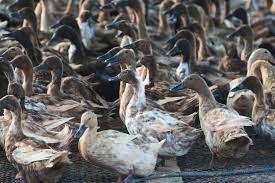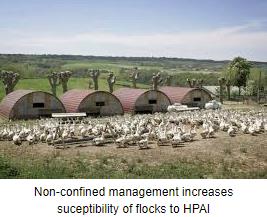 A recent press report noted that a duck flock in the Vendee Department in western France has yielded avian influenza virus, presumably on rtPCR surveillance assay. This is not an unexpected outcome. Not all ducks in a vaccinated flock will have been immunized and accordingly, in the event of exposure to the virus, infection of individual birds and propagation of virus would occur. It is unknown whether the flock received the complete sequence of vaccines previously shown to be necessary to provide solid immunity.
A recent press report noted that a duck flock in the Vendee Department in western France has yielded avian influenza virus, presumably on rtPCR surveillance assay. This is not an unexpected outcome. Not all ducks in a vaccinated flock will have been immunized and accordingly, in the event of exposure to the virus, infection of individual birds and propagation of virus would occur. It is unknown whether the flock received the complete sequence of vaccines previously shown to be necessary to provide solid immunity.
What is important is whether the infection resulted in clinical manifestations of the disease. It is also questioned as to how long individual ducks within the flock will shed avian influenza virus. Cases of low-pathogenicity avian influenza in chickens suggest that the duration of shedding is in the region of two weeks in non-vaccinated flocks.
The event in France is a valuable learning experience that will guide future policy on vaccination. Had the flock not been vaccinated, ascending mortality would have led to a diagnosis followed by obligatory depopulation. Authorities will be conducting surveillance on adjoining farms, most of which are family-operated with minimal biosecurity and in close proximity. The objective of the vaccination program was to determine whether immunization reduced the local spread of HPAI that has required extensive depopulation over consecutive years.
 The regional experiment in progress will establish whether vaccination can contribute to a reduction in mortality, maintaining production and limiting expenditure on compensation and control, given the inevitability of seasonal exposure of commercial waterfowl.
The regional experiment in progress will establish whether vaccination can contribute to a reduction in mortality, maintaining production and limiting expenditure on compensation and control, given the inevitability of seasonal exposure of commercial waterfowl.